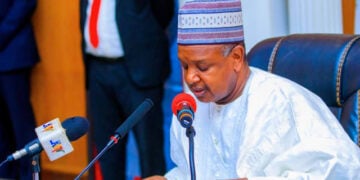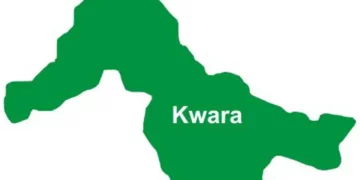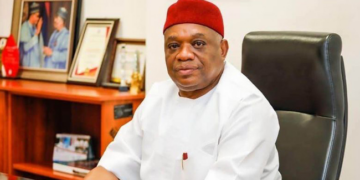In the last one month, Nigeria’s political landscape has been witnessing a change process which implications are yet to unfold. A pointer to this emerging trend is the series of high profile meetings that are scheduled to hold within and outside the country by the key actors in the 2023 presidential election. To say that these meetings are dramatically raising the political tempo ahead of the polls will be stating the obvious.
The first of such major meetings was the Ota meeting between former president Olusegun Obasanjo and the All Progressives Congress (APC) presidential candidate, Bola Ahmed Tinubu.
The candidate of the embattled Peoples Democratic Party (PDP), Atiku Abubakar and aggrieved Rivers State governor, Nyesom Wike finally met in former minister Prof Jerry Gana’s house weeks after a face off because of the outcome of the intrigues that guided the choice of the party’s presidential running mate.
The political waters were yet to settle after that meeting when Tinubu met Wike in London. From then on, it became a London affair. Wike and his team of PDP governors, Samuel Ortom (Benue), Okezie Ikpeazu (Abia); and Seyi Makinde (Oyo) subsequently met the Labour Party presidential candidate, Peter Obi in company of the Obasanjo and former Cross River State governor, Donald Duke.
In same foreign location, Wike’s team met with Atiku accompanied by Adamawa State governor, Ahmadu Fintiri who heads the PDP presidential candidate’s team.
After the London meetings, Obasanjo traveled to Minna, Niger State where he met former Military President Gen Ibrahim Badamosi Babangida and former Head of State, Gen Abdusalami Abubakar.
Days after, Tinubu and his team met former President Goodluck Jonathan in Abuja.
Evidently, these meetings represent the most strategic and influential gathering of interests that will not just shape the outcome of the forthcoming election but the mould the character and nature of the next administration.
Yet, such meetings are as inevitable as they are expected, especially during transitional elections.
To be sure, we do not feign ignorance about the peculiarities of the nation’s politics and their potency especially in any given election season. In our opinion, it can only mean one thing: enhance the viability of the candidate on offer.
Nonetheless, considering the task at hand and in light of the enormous political crisis in the country vis-a-vis the global situation, it is worth reminding these key actors not to lose the big picture of seeking office to serve rather than this rabid pursuit for power for its own sake.
We are, however, beginning to be worried that they have already began to expose, this early, the bad side of politicking in the country in which the real issues are, deliberately placed in the back burner of national discourse.
It is from this stand point that we consider the meetings held in London distasteful and demeaning of the status of Nigeria as the giant of Africa.
For these political leaders to travel in luxury and style to a foreign country to hold such meetings which they claim is about Nigeria, tells so much about their smacks of pursuit of self preservation. Or for that matter, their perception of the country vis-a-vis the instruments of office that are available to them and the recklessness with which they approach it.
That serving governors, some of whom owe workers up to six months of salary, would jet out to Europe for six days to negotiate for political power in the coming dispensation tells so much about the attitude of the political class.
In a season of economic hardship and uncertainty, the foreign travels by these political actors leave so much to be desired.
Elections have a rapturous effect on politicians especially when the prospect of victory is high which, interestingly, is often the case since the average politician is an incurable optimist.
Often, the likelihood of much attention being paid to securing power beclouds the need to follow through on manifestos and keep to campaign promises as have been the case in recent decades.
So far, the nature of these meetings smack of the political mantra of no permanent friend nor foe, only interest. But the question remains whose interest?
It is not surprising that after the return from London, an attempt is being made to brand the meetings as having been held in national interest. Whereas, the fallout of the meetings, especially within the opposition party, has been one of personal fights as nothing so far seems to suggest that these meetings are in national interests as claimed by the politicians themselves.
Soon, the campaigns will begin and the candidates will tell Nigerians their plans for quality governance in the country that has suffered so much since this democratic experience.
What’s more, the quest for political power remains the feistiest of battles, characterised by raw display of crudity especially in these times.
Indeed, for watchers of global politics, in the last few decades, the quality of politicians, given to keen negotiating skills, intuition, boldness and above all, an acute awareness of the call to human service, has declined immeasurably.
From the political crisis in the leading western democracies to the heavy-handed, human rights abuse accused governments in the other global political bloc, it is increasingly apparent that the lack of political brinkmanship caused by a dearth of skilled politicians is at the root of the crisis.
Still, the challenge is a seeming failure to conscientiously start the process of producing politicians as of old who, with proper grooming, blended the pure art and skill of politics with service to humanity.
It is our belief that the Nigerian political class should begin to reflect on this issue and rethink the modalities that that underpin




